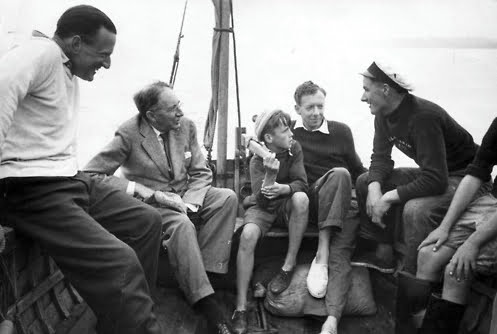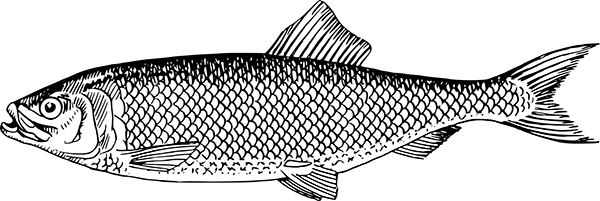On the Lowestoft-born, English composer’s creative relationship with herrings, possibly spurious, certainly little commented upon
BRITTEN

The great English composer Benjamin Britten (1913 – 1976) wrote only two operas that are herring-connected, but that’s two more than can be found in the output of most composers. He grew up in Aldeburgh and went to prep school in Lowestoft. He wrote Peter Grimes and Albert Herring at Snape in Suffolk. It isn’t surprising that herring figured in his imagination.
Peter Grimes (1945)
With a libretto by Montague Slater, Peter Grimes is centrally concerned with herrings. It’s loosely based on a tale from George Crabbe’s The Borough (1810), a poem set in a fictionalised Aldeburgh. It’s questionable whether Crabbe’s Grimes was exclusively a herring fisherman. With one boy in his employment dead, people begin to get suspicious when the replacement dies too:
One night it chanced he fell
From the boat’s mast and perish’d in her well,
Where fish were living kept , and where the boy
(So reasoned men) could not himself destroy.
Regardless of whether Grimes was guilty, herrings weren’t kept alive in the wells of boats. Flatfish, gadoids and all sorts of other fish might have been, but herrings, no. Crabbe’s father was a collector of salt duties, so he will have known his fish and conventional wisdom at the time had herrings dying immediately on being lifted out of the sea.
Grimes’ third victim died on a voyage to the London markets, when they’d caught more than could be sold locally. It’s possible Crabbe was imagining a herring catch. And banned by the Mayor of the Borough from further employment of young boys, Grimes is pictured Cursing the shoals that glided by the spot, / And gulls that caught them when his arts could not.
Britten and Slater are ambiguous about the man’s guilt, but sure about what is in his nets:
Now the Great Bear and Pleiades where earth moves
Are drawing up the clouds of human grief,
Breathing solemnity in the deep night.
Who can decipher
In storm or starlight
The written character of a friendly fate –
As the sky turns, the world for us to change?
But if the horoscope’s bewildering
Like a flashing turmoil of a shoal of herring,
Who can turn skies back and begin again?
Elsewhere, he claims to see the shoals to which the rest are blind and the chorus sings:
You Know has gone fishing and
Found them a shoal.
Pull them in in handfuls,
And in canfuls,
And in panfuls,
Bring them in sweetly,
Gut them completely,
Pack them up neatly,
Sell them discreetly,
Oh, haul a-way.
The term can, short for cannister only dates from 1839, so the chorus is already moving away from the world Crabbe describes.
Albert Herring (1947)
With a libretto by Eric Crozier, based on Le Rosier de Madame Husson by Guy de Maupassant, Britten’s Albert Herring is the story of a timid and virginal greengrocer in the fictional Suffolk town of Loxford. He is elected King of May by his fellow citizens and, after an evening of drinking, summons up the courage to break free from his mother’s apron strings and enjoy a night of sexual adventure.
The name is apparently drawn from a Suffolk grocer’s shop, but Herring is clearly used for humorous effect – as Pickelhering was by the C16th and C17th English slapstick comedians in Germany. The fish, in the hands of the women herring gutters, has obvious phallic overtones – as fish have had for centuries.
On a literal level the opera has nothing to do with herrings at all, but Humphrey Carpenter’s extensive biography, notes that when Britten was a child:
In the autumn they might accompany their mother down to the canteen she ran in the town for the Scots herring girls, who gutted and packed the fish and spoke only Gaelic, and would disappear north again after the three-month herring season. ‘Very few local people went near the fish markets,’ writes Beth [Benjamin’s sister]; ‘they despised them as being smelly, but we felt it was the most interesting part of the town.
It’s hard not to see, in the surname Herring, an imagining of vulnerable Albert on his way to the exotic and innuendo-rich hands of the gutters.
